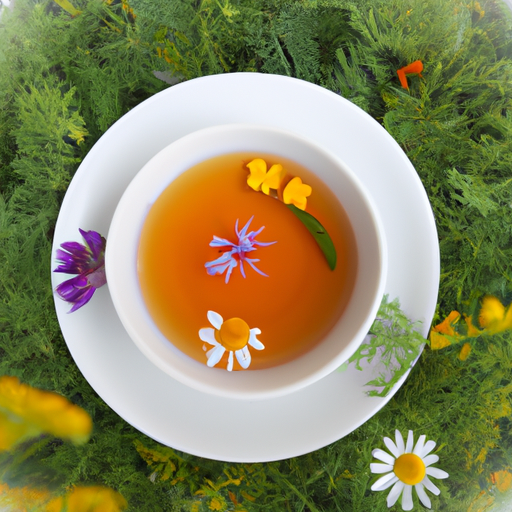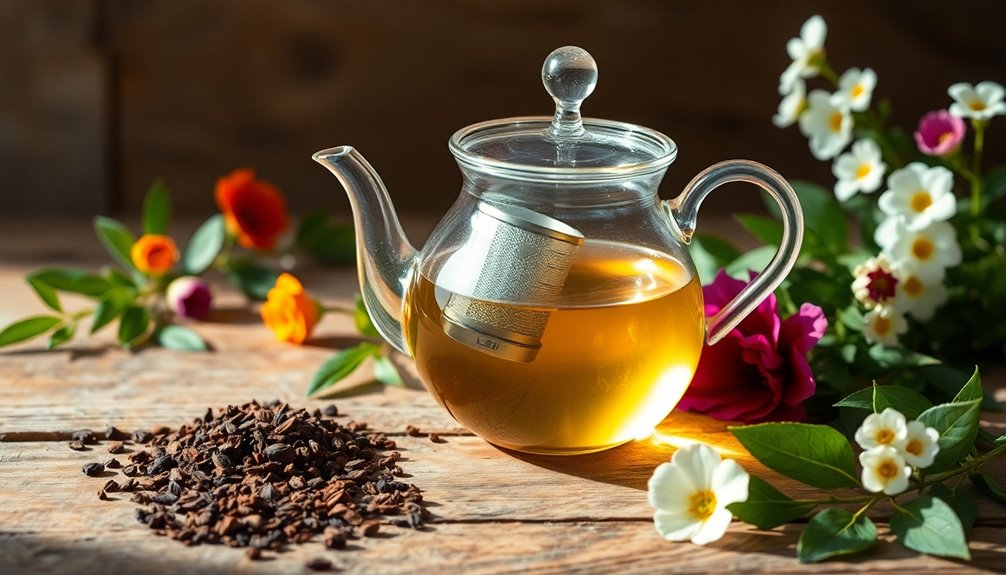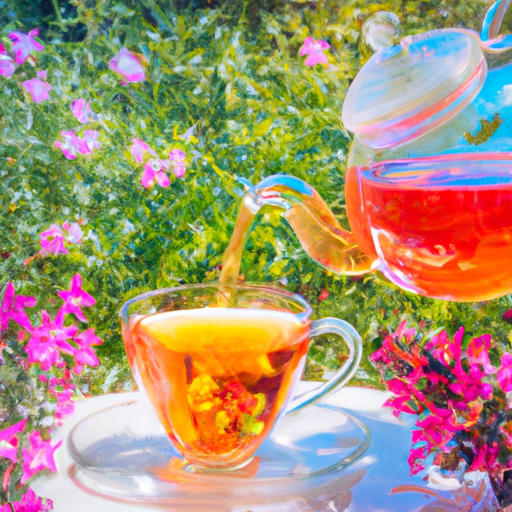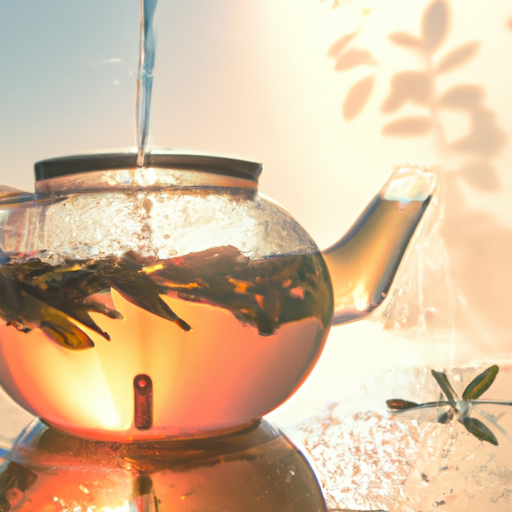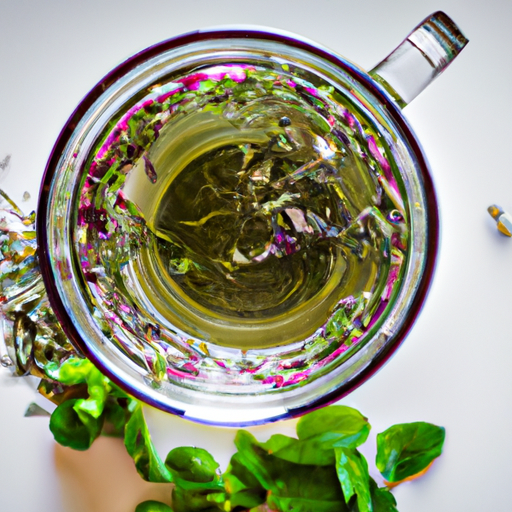Are you searching for a natural remedy to treat acne? The power of herbal tea may be just what you need. There are numerous herbs that can effectively help clear up your skin when it comes to fighting acne.
From reducing inflammation to balancing oil production, these herbs offer a holistic approach to treating acne.
Chamomile soothes inflammation and reduces redness, while green tea acts as an antioxidant and helps to reduce oil production.
Peppermint calms irritated skin and has antibacterial properties, while lavender promotes healing and fights acne-causing bacteria.
Turmeric reduces inflammation and helps to even out skin tone, while rosemary clears clogged pores and balances oil production.
Lastly, spearmint regulates hormone levels and reduces hormonal acne.
By harnessing the power of these herbs in a soothing cup of herbal tea, you can nourish your skin from the inside out. Say goodbye to harsh chemicals and hello to a natural, effective solution for acne.
Key Takeaways
- Chamomile tea can soothe inflammation, reduce redness, and prevent bacterial growth on the skin, making it beneficial for acne breakouts.
- Green tea contains antioxidants and catechins that fight inflammation, reduce sebum production, and have antibacterial effects, making it effective for acne-prone skin.
- Peppermint tea has calming and cooling effects on the skin, as well as antibacterial properties, making it effective against acne-causing bacteria.
- Spearmint tea regulates hormone levels, balances oil production, and reduces hormonal acne severity.
Chamomile: Soothes inflammation and reduces redness
If you’re dealing with pesky acne, chamomile is your go-to herb for soothing inflammation and calming down redness. Chamomile has been used for centuries for its numerous health benefits, and it’s ability to improve skin conditions is no exception. When it comes to acne, chamomile is particularly effective due to its anti-inflammatory properties. It helps to reduce redness and swelling associated with acne breakouts, providing much-needed relief to irritated skin.
One of the main reasons why chamomile is beneficial for acne is its ability to soothe inflammation. Acne is often accompanied by inflammation, which can make breakouts look even worse. Chamomile works by reducing the production of inflammatory compounds, helping to calm down irritated skin and promote healing. Additionally, chamomile tea can be used topically as a natural toner to further reduce inflammation and redness.
In addition to its anti-inflammatory properties, chamomile also has antioxidant effects. This means it can help protect the skin from damage caused by free radicals, which can contribute to the development of acne. By incorporating chamomile tea into your skincare routine, you can not only soothe existing acne but also prevent future breakouts.
Transitioning into the next section, another herb that can be beneficial for acne is green tea. Green tea acts as an antioxidant and reduces oil production, making it an excellent choice for those struggling with acne-prone skin.
Green tea: Acts as an antioxidant and reduces oil production
Green tea, known for its antioxidant properties and ability to reduce oil production, can be beneficial for those dealing with acne. The benefits of green tea for the skin are numerous. It contains powerful antioxidants called catechins, which help fight inflammation and damage caused by free radicals. These antioxidants also help to reduce the production of sebum, the oily substance that can clog pores and lead to acne breakouts.
In addition to its antioxidant properties, green tea also has antibacterial effects. This can be particularly helpful for those with acne-prone skin, as it can help to kill the bacteria that contribute to breakouts. Green tea can also soothe inflammation and redness, making it an ideal choice for those with sensitive skin.
To incorporate green tea into your skincare routine, you can brew a cup of green tea and let it cool. Then, use a cotton ball to apply the cooled tea to your face as a toner. You can also make a green tea face mask by mixing brewed green tea with some honey and applying it to your skin for 10-15 minutes before rinsing off.
Transitioning to the next section, peppermint is another herb that can be beneficial for acne-prone skin.
Peppermint: Calms irritated skin and has antibacterial properties
When it comes to soothing irritated skin and fighting bacteria, peppermint is your go-to herb. Peppermint has a number of benefits when it comes to skincare routines. Firstly, it has a cooling effect on the skin, helping to reduce redness and inflammation caused by acne. It also has antibacterial properties, which can help to kill off the bacteria that contribute to acne breakouts. Additionally, peppermint has a calming effect on the skin, making it a great option for those with sensitive or easily irritated skin.
Incorporating peppermint into your skincare routine is simple. One way to do this is by using peppermint tea as a toner. Simply brew a cup of peppermint tea, allow it to cool, and then apply it to your skin using a cotton pad. This will help to soothe and refresh your skin, while also providing it with the antibacterial benefits of peppermint.
Another herb that can help calm acne flare-ups is chamomile tea. Chamomile has anti-inflammatory properties, which can help to reduce redness and swelling associated with acne. It also has a calming effect on the skin, helping to soothe any irritation or discomfort. You can use chamomile tea topically by steeping a tea bag in hot water, allowing it to cool, and then applying it to your skin as a compress.
Transition: Now that we’ve discussed the benefits of peppermint and chamomile tea for acne-prone skin, let’s move on to lavender, another herb that can promote healing and reduce acne-causing bacteria.
Lavender: Promotes healing and reduces acne-causing bacteria
Lavender, with its healing properties and ability to combat acne-causing bacteria, is a perfect addition to any skincare routine. When it comes to acne treatment, lavender essential oil can be used topically to help reduce breakouts and promote healing. Its antimicrobial properties make it effective against the bacteria that contribute to acne formation. Applying a diluted form of lavender oil directly to the affected areas can help soothe inflammation, reduce redness, and prevent further breakouts.
Chamomile tea, on the other hand, can be used both internally and externally to reduce acne inflammation. When consumed as a tea, chamomile can help calm the body and reduce stress, which’s often a trigger for acne. Additionally, chamomile tea can be used topically as a toner or in a face mask to soothe irritated skin and reduce redness. It has anti-inflammatory properties that can help alleviate acne symptoms and promote a clearer complexion.
Transitioning to the next topic, turmeric is another herb that’s beneficial for acne-prone skin. Turmeric has anti-inflammatory properties that can help reduce redness and swelling associated with acne. Additionally, it can help even out skin tone and reduce the appearance of acne scars.
Turmeric: Reduces inflammation and helps even out skin tone
To achieve a more radiant complexion, you can incorporate turmeric into your skincare routine as it works to reduce inflammation and improve skin tone. Turmeric is a powerful herb that’s been used for centuries in traditional medicine for its numerous health benefits.
When it comes to acne, turmeric can be highly beneficial due to its anti-inflammatory properties. It helps calm the skin, reduce redness, and soothe irritation caused by acne breakouts. Additionally, turmeric contains antioxidants that help even out skin tone and reduce the appearance of acne scars.
In addition to turmeric, chamomile is another herb that can be beneficial for acne-prone skin. Chamomile has anti-inflammatory and antimicrobial properties, making it effective in reducing redness and fighting acne-causing bacteria. It can also help soothe irritated skin and promote healing. Incorporating chamomile into your skincare routine, either through a herbal tea or as a topical treatment, can help improve the overall condition of your skin.
Moving on to the next section, rosemary is another herb that can work wonders for acne-prone skin. It has natural antiseptic properties that help clear clogged pores, prevent breakouts, and balance oil production.
Rosemary: Clears clogged pores and balances oil production
After exploring the amazing benefits of turmeric for acne, let’s delve into another powerful herb that can work wonders for your skin: rosemary. Not only is rosemary a flavorful herb used in cooking, but it also offers numerous benefits for skin health when consumed as a tea.
One of the main benefits of rosemary tea for skin health is its ability to clear clogged pores and balance oil production. This is particularly beneficial for individuals with oily or acne-prone skin. By reducing excess oil and unclogging pores, rosemary tea helps prevent the formation of blackheads, whiteheads, and pimples.
Additionally, rosemary tea possesses antioxidants and anti-inflammatory properties that can help soothe irritated skin and reduce redness. It can also help improve circulation, which aids in promoting a healthy complexion and a natural glow.
To incorporate rosemary tea into your skincare routine, simply brew a cup of tea using fresh or dried rosemary leaves. Allow it to steep for a few minutes before straining and enjoying its refreshing taste. You can drink it daily or apply it topically as a toner by allowing it to cool and using a cotton pad to gently apply it to your face.
Now, let’s move on to our next herb, spearmint, which is known for its ability to regulate hormone levels and reduce hormonal acne.
Spearmint: Regulates hormone levels and reduces hormonal acne
Spearmint, with its hormone-regulating properties, can effectively reduce hormonal acne, providing a natural solution for those struggling with imbalanced hormone levels. Hormonal acne is often caused by an excess of androgens, which stimulate the production of oil in the skin. By regulating hormone levels, spearmint helps to balance oil production, preventing clogged pores and reducing the occurrence of acne breakouts.
One way to incorporate spearmint into your daily routine is through herbal tea. Drinking spearmint tea regularly can help regulate hormone levels and reduce hormonal acne. The active compounds in spearmint tea work to inhibit the production and activity of androgens, effectively reducing the severity of acne breakouts. It’s important to note that while spearmint tea can be beneficial, it shouldn’t replace any prescribed acne treatments or medications.
In addition to spearmint, chamomile tea can also be beneficial for acne. Chamomile has anti-inflammatory properties that can help soothe irritated skin and reduce redness associated with acne. It also has antibacterial properties that can help prevent bacterial growth on the skin, reducing the risk of infection and further breakouts.
Regulating hormones and reducing acne with spearmint is a natural and holistic approach to treating hormonal acne. Incorporating spearmint tea into your daily routine, along with chamomile tea for added benefits, can provide a natural solution for those struggling with acne caused by imbalanced hormone levels.
Frequently Asked Questions
What are some other benefits of using chamomile in herbal tea for acne?
Chamomile is an excellent addition to herbal tea for acne due to its numerous benefits for the skin. It has anti-inflammatory properties, soothes irritation, reduces redness, and promotes overall skin health. Chamomile is a true skincare gem.
Can green tea be used topically as a treatment for acne?
Green tea has numerous benefits as a topical acne treatment. It contains antioxidants that help reduce inflammation and fight bacteria. Other alternative herbal remedies for acne include tea tree oil and aloe vera.
How does peppermint help with reducing acne?
Peppermint helps reduce acne by its anti-inflammatory and antimicrobial properties. Incorporate peppermint into your skincare routine by using peppermint essential oil diluted in a carrier oil, or by using skincare products that contain peppermint extract.
Are there any potential side effects of using lavender in herbal tea for acne?
There are potential side effects of using lavender in herbal tea for acne. While lavender is generally safe, some people may experience skin irritation or allergic reactions. Alternative herbs for treating acne include tea tree oil and chamomile.
Can turmeric be used as a face mask to treat acne?
Yes, turmeric can be used as a face mask to treat acne. It has anti-inflammatory properties that can help reduce redness and swelling. Additionally, chamomile in herbal tea can provide soothing benefits to the skin.
Conclusion
In conclusion, incorporating herbal teas into your skincare routine can be a holistic and effective approach to managing acne. Chamomile, with its soothing properties, reduces inflammation and redness, while green tea acts as an antioxidant, reducing oil production. Peppermint calms irritated skin and has antibacterial properties, and lavender promotes healing and fights acne-causing bacteria. Turmeric reduces inflammation and helps even out skin tone, while rosemary clears clogged pores and balances oil production. Lastly, spearmint regulates hormone levels, combating hormonal acne. By harnessing the power of these herbs, you can achieve clear and radiant skin. So, why not sip your way to a healthier complexion?

